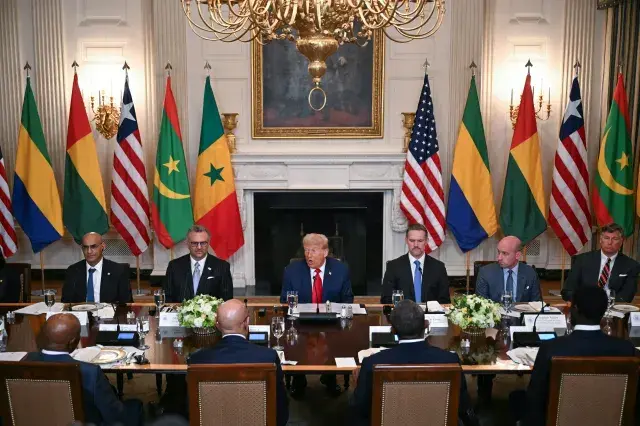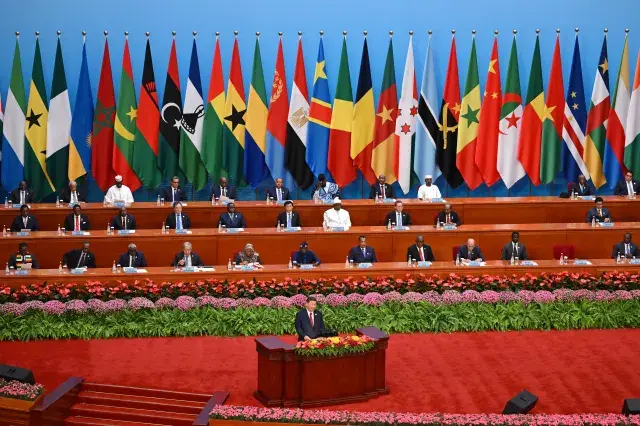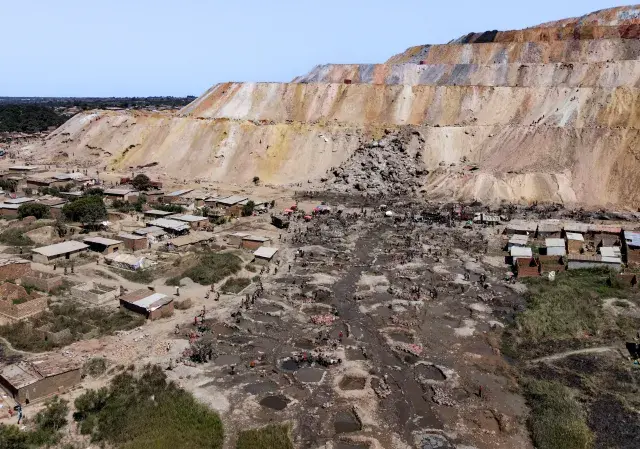-
U.S. Fighter Jet Shoots Down Iranian Drone Amid Heightened Tensions - 31 mins ago
-
White House Reacts to Savannah Guthrie's Mom's Abduction - 48 mins ago
-
Pregnant woman, unborn child killed by car while riding bicycle with family in Playa del Rey - about 1 hour ago
-
‘Don Colossus,’ a Golden Statue of President Trump, Waits for Its Home - about 1 hour ago
-
Supreme Court’s ‘Unusual’ Shift From Last Two Terms - about 1 hour ago
-
Former Prince Andrew’s New Accuser Faces Major Lawsuit Hurdles - 2 hours ago
-
A Lifeline for Gaza - 2 hours ago
-
Jewish Heirs Say Met Museum Pissarro Was Sold Under Nazi-Era Duress - 3 hours ago
-
Bill Simmons Floats Theory Behind James Harden’s Trade Rumors - 3 hours ago
-
Police Search X’s Premises in France as Prosecutors Summon Elon Musk - 3 hours ago
Trump’s Next Big Deal Awaits in Africa
President Donald Trump’s reshaping of U.S. diplomacy has touched only the tip of the iceberg in Africa but the vast continent, home to more than 1.5 billion people and large shares of critical resources, has increasingly demonstrated its significance on the international stage.
In fact, many analysts view Africa—with its 54 nations, each of them bearing unique challenges and opportunities—as one of the world’s most important geopolitical theaters, one that has thus far eluded a sustained, substantial U.S. strategy to explore its untapped potential.
The U.S.’ top rival, China, on the other hand, has doubled down on its decades-long prioritization of ties across Africa at a time of growing competition with Washington that includes a scramble for the very kind of rare earth elements many African nations possess—and over which Beijing dominates in global processing.
But this could change under Trump, whose transactional foreign policy is finding willing partners in Africa at a time when the U.S. may need them most.
“Trump’s deal-focused diplomacy could actually improve upon some of the things that perhaps previous administrations’ more traditional diplomatic approaches may have under-delivered on,” Landry Signé, distinguished fellow at Stanford University’s Center for African Studies and senior fellow at the Brookings Institution’s Global Economy and Development Program and Africa Growth Initiative, told Newsweek.
“African leaders increasingly prefer clear transactional relationships over conditional aid structures, with the recent DRC-Rwanda peace agreement representing this pragmatic approach,” he said. “However, success requires recognizing African agency and not viewing them as just tools in a power competition.”

‘Power, Prosperity, Peace and Principles’
Trump’s diplomatic intervention in securing a ceasefire between the Democratic Republic of Congo and Rwanda marked one of a series of peacemaking initiatives touted by the president as proof of his foreign policy success. While, as with many other fronts in Asia and Europe in which Trump has pursued diplomatic resolutions, lasting calm remains uncertain in the bloody conflict plaguing the heart of Africa, the move drew attention to the capacity for the president to play a greater role in the region.
Doing so, however, would require the White House to revamp and broaden its outlook toward the continent, taking into account the full breadth of the task—along with the potential benefits that already align with U.S. goals.
Signé described “U.S. foreign policy toward Africa as driven by four Ps: power, prosperity, peace, and principles,” of which “President Trump is clearly mainly driven by power and prosperity.”
But citing a May report in which he outlined “a new US-Africa blueprint for Trump amid China’s rise,” he also argued that “a new Africa strategy must deliver on all four fronts,” including a “reignition and reconfiguration of support for U.S. companies and small and medium-sized enterprises (SMEs) to further invest in the continent boasting 13 of the 20 fastest-growing economies in the world in 2025.”
“The Trump administration’s transactional approach may actually align well with African leaders’ preference for ‘trade not aid’ partnerships,” Signé said. “Africa possesses approximately 30 percent of the world’s critical minerals reserves yet the U.S. only imports four critical minerals from two African countries even though the continent has 35 nations with significant reserves.”
Furthermore, he felt that “there are many geopolitical stakes,” noting how China today “controls 85 percent of global rare earth processing” and how “China’s $240 billion trade relationship with Africa dwarfs America’s $47 billion.”
“The U.S. could establish regional processing hubs in Africa which would create jobs and better secure supply chains,” Signé said. “This approach addresses African aspirations outlined in the African Green Minerals Strategy while meeting U.S. strategic needs. The success of the Lobito Corridor, which mobilized over $3 billion in railway and energy investments, is an example of the potential for more comprehensive infrastructure partnerships.”
The Lobito Corridor is a planned 800-mile railway that would establish a major economic route by linking Angola’s port of Lobito to the landlocked nations of DRC and Zambia. The initiative has won the support of the U.S. and European Union with major potential to ramp up rare mineral access, yet China has a substantial head start in already having delivered on the Tanzania-Zambia (TAZARA) railway built in the 1970s with help from an interest-free Chinese loan, as well as reports of new $1.4 billion pledge last month to modernize the railway.
Chinese companies also reportedly own or maintain a stake in 15 of the 19 cobalt mines in the DRC, which accounts for 80 percent of the world’s output, with Beijing pursuing plans to expand investments.
And whereas 22 African nations have been slammed with new tough trade measures this year as part of Trump’s “Liberation Day” tariff strategy, Beijing responded by eliminating all tariffs on imports from 53 African nations, excluding only Eswatini, which maintains relations with Taiwan, which is claimed by China.
There’s another area where Signé saw potential in a U.S. change of course on Africa that could turn the tide in Washington’s favor.
“Digital transformation is also another opportunity the U.S. should seize. Africa’s median age of 19 and its expansion of tech ecosystems align with America’s AI leadership,” he said. “U.S. technology partnerships can build human capital and entrepreneurship which could be a comparative advantage compared to China.”

‘No Excuse for Slacking’
J Peter Pham, who served as U.S. special envoy to the Great Lakes and Sahel regions of Africa in the first Trump administration, also emphasized the significance of the U.S. finding ways to engage African partners in ways that would benefit both sides, particularly in the field of resource extraction.
“Increased U.S. investment in the African mining sector is certainly vital not only for securing American access to the strategic metals and minerals that Africa has in abundance and which China has had largely been allowed to develop a virtual stranglehold over, but it is also of potentially transformative for African countries themselves,” Pham told Newsweek.
Moreover, he argued, “it is not just a question of who extracts these critical minerals, but also who processes them and how much of the value chain is captured by whom,” pointing out that the “monopolistic dominance of any one nation,” exemplified by China’s current approach to the DRC, allows that nation “to essentially set the price—which, in turn, affects the revenue that Congo receives for its own resources.”
“There is also how U.S. and other Western companies operate in terms of corporate governance, environmental commitments, and other standards that Chinese and other companies do not adhere to as well as the economic and political realities that mean that more of beneficiation is likely to take place in Africa—all to the benefit of African governments and nations,” Pham added.
It’s not just China that has accelerated inroads across Africa.
Russia has set out to channel Soviet-era ties with a number of African nations to forge tighter partnerships based both on resources and defense as a number of countries grow disillusioned with Western security arrangements, particularly those with France.
After a series of coups rocked Sahel nations Mali, Burkina Faso and Niger in recent years, Russia’s paramilitary Africa Corps—rebranded from the former Wagner Corps private military company after the death of its leader, Yevgeny Prigozhin, in a plane crash shortly after he rebelled against his own government—has expanded operations in the restive region. Africa Corps personnel are also reportedly active in Libya and the Central African Republic, another nation that ousted French forces.
The so-called “Françafrique”—the lasting French sphere of influence over former colonies in Africa—suffered yet another blow earlier this month when Madagascar’s pro-France president was pushed from power by the military.
But here, too, Pham saw possible U.S. advantages amid the present order.
“While China, Russia, and other geopolitical competitors have made significant inroads in Africa, they may have also peaked,” Pham said. “While that is no excuse for slacking on the part of American policymakers, it is also true that China’s own economic woes have meant that it no longer can simply throw money around. In fact, the flow of Chinese investment and concessionary loans to Africa today is barely half of what it was a decade ago.”
“Likewise, while Russia exploited opportunities—some of them admittedly unforced blunders by Western governments, including the Biden administration—the Sahel regimes and other African countries have seen the very real limits of what the Wagner Group and its successors are able to achieve in terms of security,” he added.
As such, he argued that successful engagement with Africa may also contribute to Trump achieving his signature MAGA vision.
“Given the geopolitical stakes when one considers not just natural resources, but also demographic trends and security considerations, Africa’s strategic importance over the long term to the United States is perhaps not sufficiently appreciated,” Pham said. “While, strictly speaking, we do not need Africa to make America great again, it will be a lot easier to achieve that goal in partnership with key African countries than without them.”

‘The Challenge at This Moment’
Ebenezer Obadare, senior fellow for Africa studies at the Council on Foreign Relations, argued that it was now incumbent on the Trump administration to take advantage of uncertainties surrounding Africa’s current partnerships to establish credible alternatives.
“More than anything else, I think the challenge at this moment is for Washington to make clear why it is different from China and Russia, and why African countries should not elope with their current suitors,” Obadare told Newsweek. “Incidentally, I think the U.S. may have an advantage in this regard given the average African’s well-known partiality to the U.S and Western countries in general.”
“The other fact worth noting which may redound to the advantage of the U.S. is that a growing number of African countries are starting to sour on Russia and making overtures to the U.S and France behind the scenes,” Obadare said. “Ultimately, the outcome of all this maneuvering will be determined less by Trump’s ‘diplomatic style’ and more by how successful Washington is in building rapport and offering tangible benefits and assurances.”
Yet he identified two areas in which he felt the White House had yet to sufficiently outline its stance to the extent that it would rise to the level of the kind of groundbreaking diplomacy the president promised upon winning office a second time.
“First, it is not clear the extent to which it represents a continuation (or discontinuation?) of what he did during his first term under the auspices of ‘Prosper Africa,’ and I think not building on that or establishing that relationship is a critical mistake,” Obadare said. “Second, Trump’s Africa strategy is ‘underdeveloped’ inasmuch as it remains untethered to any broader American foreign policy goals, historically speaking.”
“Going forward, is America in it for business only?” he added. “Nothing wrong with that to the extent that you can make it all hang together, but he hasn’t.”
In the meantime, the U.S.-China feud over rare earth elements has only escalated. Earlier this month, Beijing announced new restrictions on the exports of these minerals critical to producing many modern technologies—from smartphones and laptops to electric vehicles and state-of-the-art weaponry—in response to Washington’s export controls targeting China’s access to advanced semiconductors and manufacturing tools.
Both sides accuse one another of weaponizing supply chains to score points in a long running geopolitical rivalry in which Africa increasingly and unwittingly finds itself at the center.
Newsweek has reached out to the Chinese Embassy to the United States and the U.S. State Department for comment.

‘A Breath of Fresh Air’
Still, some in Africa remain hopeful that the current administration represents a new chance to shatter vicious cycles that have stymied growth and engagement. Among them is Samuel Ikome Sako, a U.S.-based political activist who serves as exiled president of the self-proclaimed Federal Republic of Ambazonia in Cameroon.
While Sako also actively campaigns in support of Ambazonia, the resource-rich Anglophone region also known as Southern Cameroons, and its quest for greater autonomy from otherwise predominantly Francophone Cameroon, he sees the potential for Trump to pave a future-oriented path for U.S. partnerships across the continent beyond what he views to be an outdated Cold War-era approach rooted in ideological rather than pragmatic engagement.
“That’s why the advent of President Trump’s diplomacy is a breath of fresh air, because I can say that it brings hope the rest of the continent,” Sako told Newsweek. “Some of us were not born in 1945 or the 1960s when this present order was established on the continent. We don’t understand why we should be completely neglected, abandoned by people who don’t see us for who we are.”
“When they’re talking to Africa, they’re talking to ghosts that are not there,” he added. “The real people who are there. They don’t hear or talk to them. So, that’s who we represent. We represent the generation that want to engage, wants to be heard, wants to talk, wants to create alliances.”
Thus far, Sako argued, “China understood the approach” necessary to penetrate across Africa, capitalizing on economic opportunities without becoming mired in political squabbles, while successive U.S. administrations instead largely backed fellow Western powers, “allowing France to take the lead in order to keep NATO and other multilateral organizations together.”
Under Trump, however, Sako said “we think that we have somebody now who can break away from those traditions, the traditional way of looking at things, and even listen and even have a conversation with this generation, not with the past generation.”
The task is particularly urgent, he asserted, as “Africa is the future,” given its unmatched reserves of human capital and natural resources that will come to define the dawning reality that is the nexus of supply chains and geopolitics.
“The world of tomorrow is built on who has access and control of these resources, and what’s the relationship of those who have access and those who have control,” Sako said. “That is how it’s going to be. So, America is losing on this.”
“Everywhere the people have gone the Chinese way, and they are loaded with debts. China has more influence, and they are gradually taking over the political space,” he added. “And America has to probably get everything in the future through China if they don’t do something right now.”
Source link













